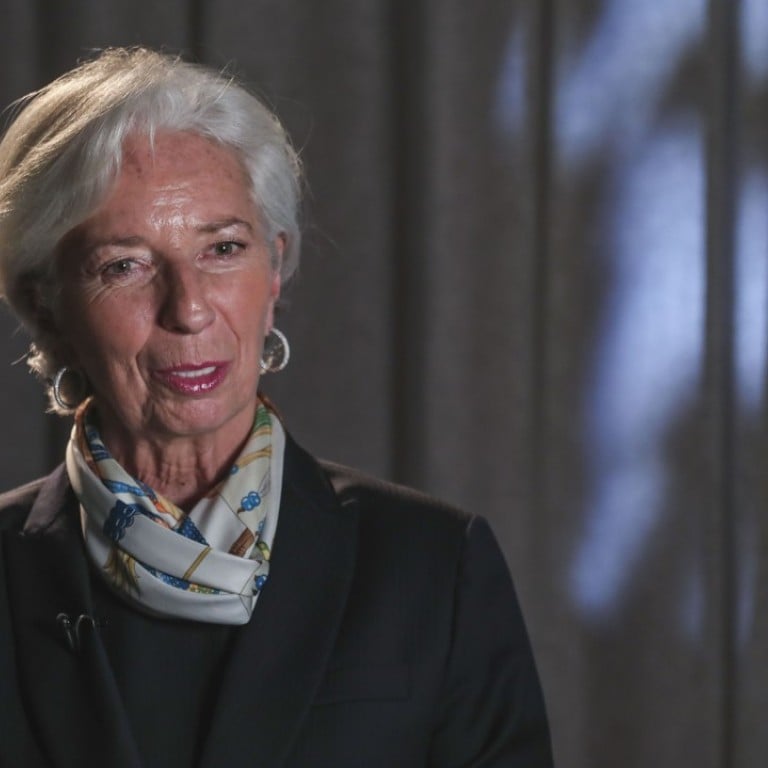
IMF chief Christine Lagarde expresses concern over rising global debt levels, including China’s
Managing director of International Monetary Fund says also that governments must ‘steer clear of protectionism in all its forms’
The head of the International Monetary Fund said on Wednesday that global debt, including that of China, had soared to 220 per cent of global output, a staggering level that did not bode well for member economies.
The Bank of International Settlements, which serves as a central bank to the world’s central banks, last month included China and Hong Kong on a list of economies whose debt-to-GDP ratios had raised “red flags”. The IMF, which employs different numbers to measure indebtedness, was urging its members to pare their debt to serviceable levels to sustain them through the next economic downturn, IMF Managing Director Christine Lagarde said in an interview with the South China Morning Post after giving a speech at the University of Hong Kong.
“There’s a saying in French that we should fix the roof while the sun is shining,” she said.
She said that the world, including Beijing, needed to tackle its debt problems, adding that 40 per cent of the global debt added since 2007 had come from China.
In the world economy, the debt problem was casting a shadow over future growth prospects, she said.
“This is a potential risk that is looming on the horizon of the otherwise quite sunny sky of the global economy,” she said.
Lagarde was visiting Hong Kong after attending the Boao Forum for Asia in the south China island province of Hainan.
She said also that giving the Chinese yuan nominal international currency status had been the right decision, and that she expected its global use to rise.
“The degree of internationalisation of the renminbi [an alternative name for the yuan] went down a little bit, but it’s now picking up again … [and is expected to] continue to do so,”
The decision to add the yuan to the fund’s basket of Special Drawing Rights was “well taken”, she said.
The IMF took the decision to include the yuan in the SDR basket in 2015, giving it equal status with the US dollar, the euro, British pound and Japanese yen. The move came into effect in October 2016 and was hailed by Beijing as a nod to its efforts at financial liberalisation.
However, the Chinese government’s imposition of draconian curbs on outbound investment and capital outflows since the stock market rout in the summer of 2015, has fanned allegations that it has been back-pedalling with regards to creating a freely usable yuan.
Yi Gang, the newly appointed governor of the People’s Bank of China, said in Boao on Wednesday that Beijing was committed to making the yuan a fully convertible currency, but wanted to do so on a gradual basis.
According to data compiled by the SWIFT network, the yuan’s share of global payments fell to 1.56 per cent in February, from 1.66 per cent a month earlier, ranking it below not only the world’s big four currencies, but also the Swiss franc and Canadian dollar.
The yuan’s high point in terms of global payments came in August 2015, when it ranked fourth most popular for the month, with 2.79 per cent.
Lagarde said the IMF’s recognition of the yuan had encouraged central banks and other operators to see it as “one of the currencies of international value”.
She said many of the new members of China’s economic team – at the central bank, finance ministry, and a new commission for financial stability and development – were familiar to the fund and that the two sides would continue to work together.
Before his promotion last month, Yi was a deputy central bank governor and had attended several IMF events.
In her speech, she criticised trade protectionist measures and import restrictions, although she made no direct reference to the ongoing dispute between China and the US.
“Governments need to steer clear of protectionism in all its forms,” she said.
“History shows that import restrictions hurt everybody”, in particular poor people, as such moves led to fewer choices and higher prices, she said.
As for the annual meeting of IMF scheduled for next week in Washington, Lagarde said the event would provide a platform for member countries to talk and “to make sure there’s no protectionism preventing the flow of trade”.
Asked whether she was optimistic that compromises would be reached between China and the United States, she said: “I am desperately optimistic, always.”


